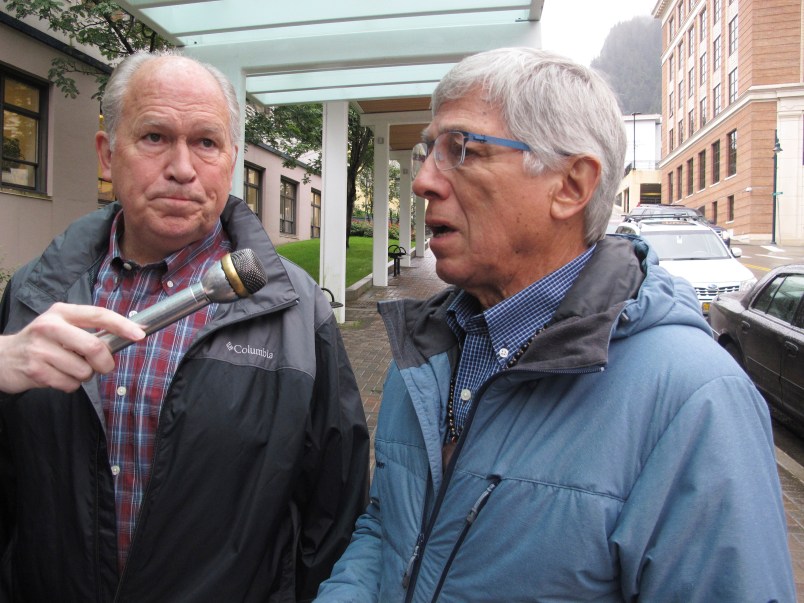JUNEAU, Alaska (AP) — In a stunning October surprise, Alaska’s lieutenant governor resigned Tuesday for making unspecified “inappropriate comments,” imperiling the re-election hopes of Gov. Bill Walker, a man with whom he shared a brother-like bond.
Walker, who has been locked in a tough re-election fight with Democrat Mark Begich and Republican Mike Dunleavy, had already been in talks with Begich. The talks centered on a “path forward for Alaska” and stemmed from concerns about Dunleavy and the dynamics of a three-way race, Walker campaign manager John-Henry Heckendorn said. Begich’s campaign manager did not immediately return a message.
Walker described Lt. Gov. Byron Mallott’s comments as an “inappropriate overture to a woman,” Walker spokesman Austin Baird said.
Mallott’s sudden departure is a shocking blow to a ticket that began of political necessity in 2014 but grew into a partnership born of respect and trust.
Walker and Mallott, both running for governor in 2014, decided their best shot at defeating Republican Gov. Sean Parnell was to join forces. As part of that arrangement, backed by state Democrats, Walker changed his party affiliation from Republican to undeclared and Mallott, an Alaska Native leader and Democrat, ran as Walker’s lieutenant governor. They won.
Neither felt he was making a huge sacrifice: Walker, who had skipped the Republican primary for an outsider bid, said he had felt marginalized by the GOP. Mallott, who had developed an easy rapport with Walker while they were rivals, said he trusted him.
The seeds of their relationship had been sown months earlier, which the two spoke about in recent interviews.
Mallott, impressed that Walker had not flitted in and out of the Alaska Federation of Natives conference as he said candidates sometimes did, brought him onstage. That struck Walker, who called Mallott the “Elvis of AFN.”
At a debate in Nome — “our first official date,” Walker joked — they agreed on so much that people afterward suggested they should get together. Before another event, Mallott told Walker, “I never would have run against you if I had known you.”
“Who says that on the way to a debate?” Walker said.
While the two disagree on some social issues, they shared a mutual respect — greeting each other with hugs, seeking each other’s advice — and were guided, they have said, by doing what they think is right for Alaska.
Mallott said the men agreed early on that if there was a decision to be made on an issue they disagreed on because of faith or core moral values, such as abortion, that Walker would speak with him before making a final decision. But Mallott said he never forgot who was governor.
This year, their desire to run together helped seal what some have seen as an uphill battle for Walker, a three-way fight between him, Begich and Dunleavy.
After the state Democratic Party changed its rules to let independents run in its primaries, Walker flirted with going that route. But he backed out when it appeared that Begich would run. Walker instead gathered signatures to get on the Nov. 6 ballot, a move that assured he could run with Mallott. Libertarian Billy Toien also is running.
Some Democrats and independents have worried that Walker and Begich would split the vote, giving the race to Dunleavy. Libertarian Billy Toien also is running.
Dunleavy, in a statement, said his campaign has been about the people of Alaska, not politicians. While awaiting details surrounding Mallott’s resignation, he said his campaign “remains focused on restoring trust in state government.”
Mallott did not return a phone message Tuesday. Walker took no questions during a news conference with Valerie Davidson, who was sworn in as lieutenant governor Tuesday.
Mallott, in a resignation letter, apologized for “inappropriate comments I made that placed a person whom I respect and revere in a position of political vulnerability.”
Baird said the incident that led to Mallott’s resignation happened Sunday. Walker learned of the comments Monday, from his chief of staff, Baird said.
He said Walker’s office is trying to be careful in what details it releases because the woman involved does not want to be publicly identified.
Heckendorn said the talks with Begich’s campaign are separate from Tuesday’s resignation of Mallott. The talks so far have been inconclusive but will continue, he said.
Mallott’s resignation was announced shortly after an at-times testy debate in Anchorage featuring Walker, Begich and Dunleavy, the perceived front-runner.
In a statement, Walker said it’s too late for Mallott’s name to be removed from the ballot, but he said Mallott would not accept the post of lieutenant governor if elected.
Davidson will assume the role of his running mate, he said.
Victoria Campbell, who was attending the Alaska Federation of Natives conference in Anchorage as word of Mallott’s resignation began to spread Tuesday, was stunned by the news.
The Democrat from Gambell, located on St. Lawrence Island in the Bering Sea between Russia and the United States, said she didn’t know enough to comment on the resignation but did say it wouldn’t affect her vote for Walker.



